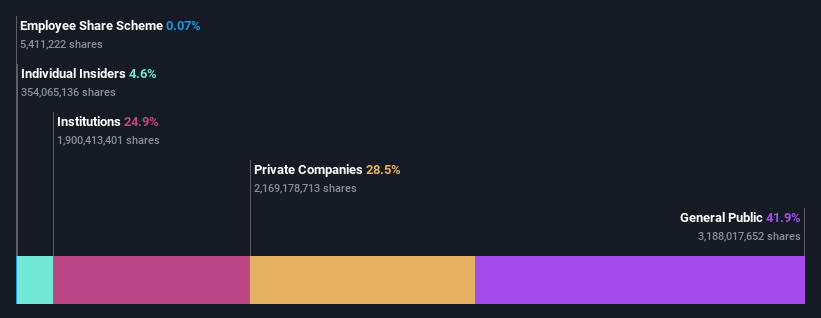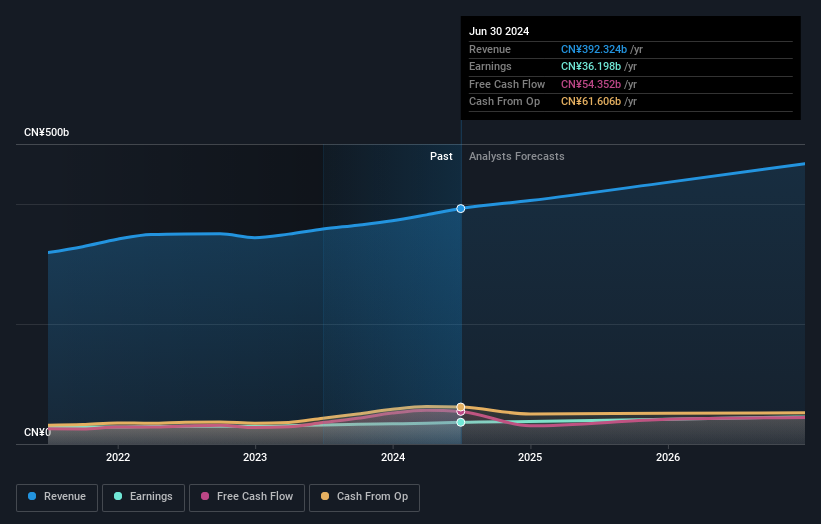- China
- /
- Consumer Durables
- /
- SZSE:000333
Midea Group Co., Ltd.'s (SZSE:000333) largest shareholders are individual investors who were rewarded as market cap surged CN¥23b last week

Key Insights
- Significant control over Midea Group by individual investors implies that the general public has more power to influence management and governance-related decisions
- The top 25 shareholders own 49% of the company
- Institutional ownership in Midea Group is 25%
To get a sense of who is truly in control of Midea Group Co., Ltd. (SZSE:000333), it is important to understand the ownership structure of the business. With 42% stake, individual investors possess the maximum shares in the company. That is, the group stands to benefit the most if the stock rises (or lose the most if there is a downturn).
As a result, individual investors were the biggest beneficiaries of last week’s 4.2% gain.
Let's delve deeper into each type of owner of Midea Group, beginning with the chart below.
See our latest analysis for Midea Group

What Does The Institutional Ownership Tell Us About Midea Group?
Many institutions measure their performance against an index that approximates the local market. So they usually pay more attention to companies that are included in major indices.
We can see that Midea Group does have institutional investors; and they hold a good portion of the company's stock. This can indicate that the company has a certain degree of credibility in the investment community. However, it is best to be wary of relying on the supposed validation that comes with institutional investors. They too, get it wrong sometimes. If multiple institutions change their view on a stock at the same time, you could see the share price drop fast. It's therefore worth looking at Midea Group's earnings history below. Of course, the future is what really matters.

Hedge funds don't have many shares in Midea Group. Midea Holding Co., Ltd. is currently the largest shareholder, with 28% of shares outstanding. For context, the second largest shareholder holds about 2.6% of the shares outstanding, followed by an ownership of 1.9% by the third-largest shareholder. In addition, we found that Hongbo Fang, the CEO has 1.5% of the shares allocated to their name.
Our studies suggest that the top 25 shareholders collectively control less than half of the company's shares, meaning that the company's shares are widely disseminated and there is no dominant shareholder.
While it makes sense to study institutional ownership data for a company, it also makes sense to study analyst sentiments to know which way the wind is blowing. There are plenty of analysts covering the stock, so it might be worth seeing what they are forecasting, too.
Insider Ownership Of Midea Group
The definition of company insiders can be subjective and does vary between jurisdictions. Our data reflects individual insiders, capturing board members at the very least. Management ultimately answers to the board. However, it is not uncommon for managers to be executive board members, especially if they are a founder or the CEO.
I generally consider insider ownership to be a good thing. However, on some occasions it makes it more difficult for other shareholders to hold the board accountable for decisions.
Shareholders would probably be interested to learn that insiders own shares in Midea Group Co., Ltd.. It is a very large company, and board members collectively own CN¥27b worth of shares (at current prices). Most would say this shows a good alignment of interests between shareholders and the board. Still, it might be worth checking if those insiders have been selling.
General Public Ownership
The general public-- including retail investors -- own 42% stake in the company, and hence can't easily be ignored. This size of ownership, while considerable, may not be enough to change company policy if the decision is not in sync with other large shareholders.
Private Company Ownership
It seems that Private Companies own 28%, of the Midea Group stock. It might be worth looking deeper into this. If related parties, such as insiders, have an interest in one of these private companies, that should be disclosed in the annual report. Private companies may also have a strategic interest in the company.
Next Steps:
While it is well worth considering the different groups that own a company, there are other factors that are even more important. Consider for instance, the ever-present spectre of investment risk. We've identified 1 warning sign with Midea Group , and understanding them should be part of your investment process.
Ultimately the future is most important. You can access this free report on analyst forecasts for the company.
NB: Figures in this article are calculated using data from the last twelve months, which refer to the 12-month period ending on the last date of the month the financial statement is dated. This may not be consistent with full year annual report figures.
New: Manage All Your Stock Portfolios in One Place
We've created the ultimate portfolio companion for stock investors, and it's free.
• Connect an unlimited number of Portfolios and see your total in one currency
• Be alerted to new Warning Signs or Risks via email or mobile
• Track the Fair Value of your stocks
Have feedback on this article? Concerned about the content? Get in touch with us directly. Alternatively, email editorial-team (at) simplywallst.com.
This article by Simply Wall St is general in nature. We provide commentary based on historical data and analyst forecasts only using an unbiased methodology and our articles are not intended to be financial advice. It does not constitute a recommendation to buy or sell any stock, and does not take account of your objectives, or your financial situation. We aim to bring you long-term focused analysis driven by fundamental data. Note that our analysis may not factor in the latest price-sensitive company announcements or qualitative material. Simply Wall St has no position in any stocks mentioned.
About SZSE:000333
Midea Group
Manufactures and sells home appliances, and robotic and automation systems in China and internationally.
Flawless balance sheet 6 star dividend payer.


